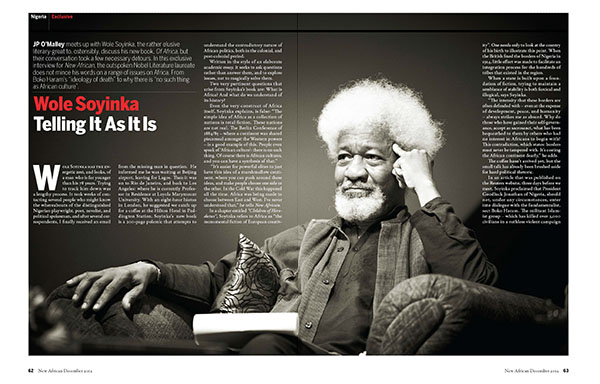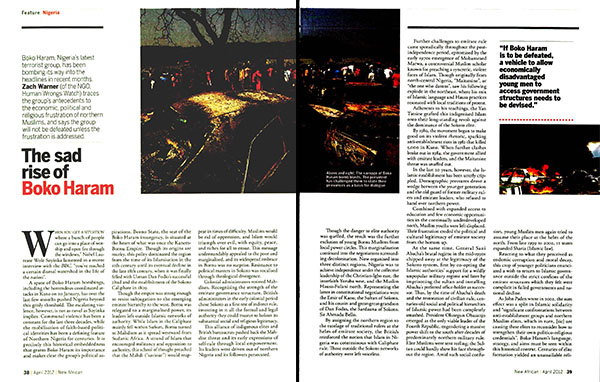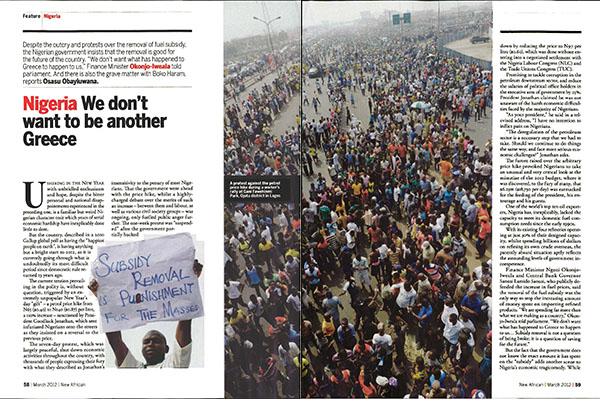 The African-American sociologist, W.E.B. Du Bois, predicted several decades ago that the crisis of race in the 20th century would be replaced by religion in the 21st. Soyinka believes that Du Bois’ statement should be elevated to a further question: Can religion peacefully cohabit with secularism as religious fanaticism increases in the Islamic world?
The African-American sociologist, W.E.B. Du Bois, predicted several decades ago that the crisis of race in the 20th century would be replaced by religion in the 21st. Soyinka believes that Du Bois’ statement should be elevated to a further question: Can religion peacefully cohabit with secularism as religious fanaticism increases in the Islamic world?
“The reason religious fundamentalism exists is simple: because it has been profitable for many people, especially those who seek power to dominate.” –Wole Soyinka
O’Malley, JP. “Wole Soyinka Telling It As It Is.” New African, December 2012, no.523: p. 64. Print.

Instead, the federal government must address shifting power structures in the north and provide an outlet for the expression of local Islamic aspirations within the framework of a stable Nigeria.
It cannot block young Muslims’ ascension to regional power or attempt to co-opt them into the ruling networks of authority. If Boko Haram is to be defeated, a vehicle to allow economically disadvantaged young men to access governance structures needs to be devised, and the long-standing fractures within Islamic society resolved.
Warner, Zach. “The Sad Rise of Boko Haram.” New African, April 2012, no. 516: p. 40. Print.
 The all-powerful centre controls the major resource in the country, the oil money. But the centre, although all-powerful economically, finds its monopoly of violence is always being challenged by groups unhappy with the status quo, whether the Biafran in the 60s, the 90s Niger Delta insurgency or now Boko Haram.
The all-powerful centre controls the major resource in the country, the oil money. But the centre, although all-powerful economically, finds its monopoly of violence is always being challenged by groups unhappy with the status quo, whether the Biafran in the 60s, the 90s Niger Delta insurgency or now Boko Haram.
These evolving tensions and arguments are not unique to Africa. The UK, which created the Nigerian nation in 1914, is currently embroiled with these arguments – internally (in relation to Scottish independence) and externally (in relation to its membership of the European Union).
Wambu, Onyekachi. “Turning Borders into Nations.” New African, October 2013, no. 532: p.106. Print.
 Sani says the 2009 extra-judicial killing of Boko Haram leader Mohammed Yusuf in Maiduguri, the Borno State capital, played a role in intensifying the attacks launched by the organization.
Sani says the 2009 extra-judicial killing of Boko Haram leader Mohammed Yusuf in Maiduguri, the Borno State capital, played a role in intensifying the attacks launched by the organization.
“We can even remove the word ‘sovereign,’ but a national dialogue there has to be,” Soyinka warns. “If you don’t have a dialogue, you will have a monologue, a series of monologues that is deadly. Right now, we are undergoing a particularly destabilizing and disorientating form of monologue… This is one of the most horrendous aspects of monologue that we have encountered in our history…
“So, it is either a dialogue or a serial monologue in which people would use their own methods. In dialogue, there is only one language; in monologue, you would have the language of Kalashnikovs, detonators and AK-47s.”
Obayiuwana, Osasu. “Nigeria: We Don’t Want to be Another Greece.” New African, March 2012, no. 515: p. 61. Print.
